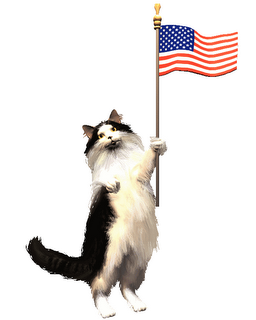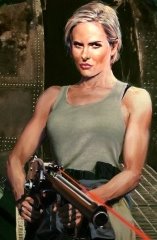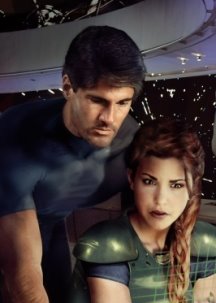Excerpted from MY FAVORITE EARTHLING
by SUSAN GRANT
copyright Susan Grant 2006
MARCH 2007
ISBN 0373771924; HQN books
This uncorrected excerpt may contain errors and other text not found in the final printed novel and is not for sale. Please don’t share the text with anyone without first receiving permission from the author to do so.
Keira was still shaking as she addressed the leaders she’d summoned from their ridiculous emergency meeting. This was the emergency! “The prince of Earth insulted me. Challenged me. Me—the queen!”
She’d bathed and changed into an exquisite bright yellow ceremonial gown. It constricted her ribs to the point where she couldn’t inhale fully, which contributed to her swimming head. But it helped constrain her temper as well. “He’s a frontiersman, a barbarian, and yet he broke every level of security we have, forcing his image onto my personal view screen.” Searing it into her mind.
Gods, he’d affected her, and in more ways than she cared to admit. She’d thought herself immune from sexy, good-looking, arrogant, supremely confident men and their charms. Particularly those well beneath her social standing.
“How could you let this happen? He taunted me. Your monarch. Your goddess. I’m humiliated and disgusted. I’m...I’m furious!”
Lightheaded, she gripped her rustling skirts in shaking hands. The fabric blotted her sweaty palms, effectively hiding the roiling fear she tried to hard to suppress and hide. You are strong. A warrior. “I want an explanation, and I want it now, or I’ll have every last one of you fools executed.”
“We have put the entire planet on full alert,” the new Minister of Intelligence, Ismae Vemekk, offered. “No craft can get in or out.”
Keira glared at the unfamiliar women with contempt. What were they doing, alternating boy-girl-boy-girl as they replaced Intelligence ministers? Spicing it up for variety? Usually the cronies stayed on in their posts for life. “Who cares about spacecraft when an Earthling can invade my privacy and taunt me at his convenience? No, it isn’t a physical invasion, but is that not the next step?”
“Earth does not have the power to invade the heart of the Coalition,” Neppal said.
“How do we know this? You yourself said that if they align with the Drakken...” She couldn’t finish the thought. “How are we to make an impression on Earth when they so easily make fools of us? Damn you, Neppal. Where were your troops when that signal came in? I was alone. Alone!”
Alone...
A memory ripped through her mind in dark, violent snatches. The smell of her mother’s skin. The sound of her fear-filled voice. They were on a ship and something had happened to it. Her mother stuffed Keira in a dark pipe barely large enough to fit her. Stay here, Keira. Do not move. Do you understand me? No matter what you hear, do not come out. And, oh, what Keira had heard. Awful things. Unforgettable things.
Keira realized she’d brought her flattened hand to her chest to quell her thumping heart. Ashamed, she made a fist. “If I cannot be safe in my own home, then where can I be safe?” She detected a slight thickening in her voice and cleared her throat. They mustn’t see her fear, they mustn’t. She picked up a wine glass Taye had filled with snowberry liqueur, knowing that it calmed her. In one gulp, she emptied it and was about to slam the glass on the table when something more appropriate came to mind. Perhaps not appropriate, but satisfying at least. Sneering, she hurled the glass at the supreme commander. Years of training with weapons had given her dead-on accuracy.
The officer blocked the glass with his arms, fists pressed together. The heavy goblet crashed to the floor and shattered. “The next one will hit the target, I swear it,” she hissed, glowering at Neppal.
Carefully, the prime minister broke in once more. “Perhaps we can see the offending visual ourselves?”
She actually felt a quickening of her heartbeat at the prospect of watching the recording again. Was the prince as proactive and forceful in the other, more personal areas of his life? He’d mentioned a harem. An image of him making love to several women threatened to take her breath away—one: because she didn’t like the thought of other women touching him, and two: no man should look that good naked. Trying to act as coolly as possible, she sashayed to her throne and sat in it with a whoosh of yellow skirts. “Show visual,” she commanded from the enormous, bejeweled chair when the leaders gathered in a half circle around the huge screen.
The recorded image was stopped and brought back to the beginning. Every one of the palace leaders present focused on the display—and the Earthling prince. It grew very quiet in the chamber. All were sizing up the man, seeing if concern was justified, and if so, to what level.
Keira sat rigidly, her hands clasped demurely on her lap, until she noticed her fingers digging into her flesh and slipped her hands under her thighs.
The Earthling’s voice filtered through the translator. His surprise slid into interest, male interest, when he first laid eyes upon her. He finds you attractive.
It took everything she had not to let his appraisal of her matter.
“How dare you?” Keira stiffened at the indignation and shock in her recorded voice. And the anger—anger at herself. That was new. Usually she was angry at other people. Another reason to despise the Earthling prince.
“Trespasser. Barbarian!”
He laughed at her then, called her the barbarian. How dare he treat her with such disrespect?
Onscreen, the Earthling prince leaned forward, his mouth formed in that half-smile that so unsettled her. She couldn’t be further than naked dressed to her chin in the layered and laced traditional gown, but every time the man’s eyes swept passed her body, she felt exposed. She shivered as she always did when hit with a sense of vulnerability, but this time the trembling was different. Quite...different.
She imagined his muscled body sweaty and naked as he struggled to free himself from the cuffs with which she’d bound him. He’d be hers, all hers, and at her mercy. She imagined tasting his skin, touching him wherever she pleased. “By the gods and goddesses,” she whispered.
Keira closed her eyes and prayed to get through this session with her dignity intact. Sometimes, it felt as if her dignity was all she had. In the frightening lonely days after losing her family, dignity served well as a protective wall, one as high and as wide as those surrounding this palace.
She fought to build that wall around her now, listening to the prince rage, “My message to you is this: if your people come back for another try at landing on Earth, we’ll be waiting. A billion more guys like me, waiting.”
The visual ended soon after. Everyone was briefly silent. No one questioned her rage now. They appeared as invaded as she felt.
The new minister of intelligence was the first of the leaders to find her voice. “I am deeply sorry at the distress this invasion caused you, Your Highness. I do not know why the transmission appeared on your screen and no one else’s, bypassing all our security. You have my word we will work ceaselessly on this until we have an answer.”
Keira nodded her thanks yet regarded the tall woman with pity. If the fates of her predecessors were any indication, Ismae Vemekk’s life span would not be noted for its longevity.
Supreme-second Fair Cirrus frowned, rubbing his knuckles across his chin. “Indeed this proves Earth’s cleverness. That cleverness could very well lead them to be reluctant choosing sides in a war they know little about.”
The age-old war with the Drakken.
“There is one way to avoid uncertainty as to their loyalties,” Rissallen said. “A failsafe way.”
“Nothing is failsafe,” Neppal barked.
“This is nearly so. A treaty to take precedence over all treaties.” The prime minister’s mouth slid into a winning smile, revealing perfect, if a little large, teeth. Rissallen could be so oily. What did he have up his sleeve this time? That they simply cut off the power to her visual communications screen? That they eavesdrop on all her private conversations for now on?
Keira slammed her hands onto the armrests of her throne. The jewels on her fingers clattered against the jeweled precious metal on the armrests. “I’ll have you know, Kellen, that I will not be coddled, talked down from my concerns.”
But the leaders seemed not to hear her. “I wonder,” Fair Cirrus said to Rissallen, “is the prince unmarried?”
Rissallen waved at the blank screen. “He did not have a wrist tattoo indicating he was married.”
“Earth tradition may differ.”
“Nor did I see any such jewelry that could possibly signify his marital status.”
“He mentioned a harem,” Fair Cirrus noted.
Keira bounced her gaze from man to man. She expected them to be counting Earth’s warships, not counting the prince’s wives.
“That’s not unusual for a man of power, no matter what his marriage status,” Neppal said. “If single, he’d maintain a harem for sport and for variety. If married, he’d certainly be entitled to additional females to ease the boredom.”
Keira snorted. “The only one bored in your bed, Commander, is the woman you take to it.”
Finally, Neppal met her gaze. A glint of malice glinted in his eyes. “I do not like the idea of bringing in an outsider to be the queen’s consort, but the more I ponder it the better it sounds,” he told the group.
“Consort?” she croaked.
Rissallen dipped in a small bow. “A treaty of marriage would put all our fears to rest because it would link Earth to the Coalition. Permanently.”
“At least until death do they part,” Neppal said smugly.
“Gods,” Vemekk said. “Tell me you’re not considering mating them.”
Mating? Her and the Earthling prince? Keira gave a little squeak. By now, her pulse was making a strange whooshing noise in her ears. “I thought plans were being made for my betrothal to a high-ranking military officer.” Not Neppal, but someone as easily dismissed. “Where is he? Why have I not met him yet?”
The group shuffled their feet and cleared their throats. “Prime Major Far Star is missing,” several admitted at once.
“What happened? Did he run away? Was he too terrified to marry me? Did he hear the rumor about my skill with a sword?” Of course, it wasn’t a rumor, but it served her well as a man deterrent.
Rissallen smiled. “We simply don’t know, My Queen. But he’s old news now. Now we have a new and better man for you to consider.”
The Earthling prince, she thought, struggling to breathe in the constricting dress. Although she wouldn’t truly be allowed to consider him, would she? They’d pretend to include her in the process but ultimately, they’d make the decisions as they always did, as they had ever since she took the throne as a child-queen, a frightened little girl lost in a sea of what she didn’t understand. You’re still that girl. Wasn’t she supposed to hold absolute and holy power? Some goddess she was. She had no free will, no control over her destiny, no choices. Not since childhood had she ventured off this world or mingled with the people who worshipped her daily in their temples. She was a prisoner in this castle, born and bred to breed, and nothing more. She’d never really matter, not like she longed to matter.
Keira strode to the huge window that looked out onto a glacial landscape which held about as much warmth as her blood did in that moment. Her breath formed mist on the glass, obscuring the dramatic views. “I wish it were summer,” she whispered, dragging a finger through the circle of vapor. For those few fleeting weeks out of the year she felt alive. She spent the glorious weeks outside and especially the nights that never grew dark. Sometimes, she even evaded the guards, if only for a few moments.
Her mood darkened. She’d evade her future husband, too. And as often as possible. Once he’d planted a baby in her belly, there was no further need to be with him.
What if he didn’t agree to the treaty of marriage?
Of course, he would. For him, it would be a huge step up. She was a goddess. The blood of Sakkara flowed in her veins. She could trace her ancestors back to the beginning of recorded time. Her family was revered as gods by trillions of Coalition citizens and billions more undocumented believers who lived across the border in Drakken space. She was the goddess they worshipped.
A goddess who felt very human most of the time.
She heard a throat being cleared, and the shuffling of feet as the leaders waited for her to turn around. They’d make the decision for her if she didn’t, citing reasons of national security. She might as well hold onto as much control as she could. She took a breath, her hands fisted at her sides. Then, with dignity holding her smoldering rage in check, she turned around and squared her shoulders. Her ornate dress rustled, the bodice squeezing her ribs. “It must be done. For the sake of my people, I will take the Earthling as my royal consort.” She wasn’t very convincing at altruism but nonetheless, she tried. Luckily, no one snickered.
Unlike the others, who seemed relieved, Vemekk and Neppal continued to act unhappy: the minister quite shocked and dismayed, and the supreme commander simply angry. The commander’s reaction Keira could explain away as sullenness over not having had the chance to go to battle against Earth with his army, but the minister’s reaction was more puzzling.
“Find out the prince’s status,” Keira said. “And if he is free”—her hands opened and closed, itching to throw daggers—“strike a deal with Earth. Tell them they may offer their prince as the price for peace and the opportunity to keep their planet.”
Rissallen slapped his hands together in delight. “Together the Coalition and Earth will present a united front to the Drakken Hoard.”
As for her united front with the Earthling, it need not exist. He’d be given a life of comfort and riches in the galaxy’s most luxurious palace. All he ever needed to sate his appetites would be available to him, so he need not look to her for his satisfaction. And if he were to persist, well, her skill with a plasma sword was legendary.
~~~*~~~






































